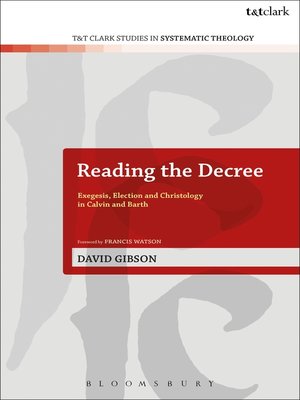Reading the Decree
ebook ∣ Exegesis, Election and Christology in Calvin and Barth · T&T Clark Studies in Systematic Theology
By David Gibson

Sign up to save your library
With an OverDrive account, you can save your favorite libraries for at-a-glance information about availability. Find out more about OverDrive accounts.
Find this title in Libby, the library reading app by OverDrive.



Search for a digital library with this title
Title found at these libraries:
| Library Name | Distance |
|---|---|
| Loading... |
What role does the interpretation of Scripture play in theological construction? In Reading the Decree David Gibson examines the exegesis of election in John Calvin and Karl Barth, and considers the relationship between election and Christology in their thought. He argues that for both Calvin and Barth their doctrine of election and its exegetical moorings are christologically shaped, but in significantly different ways.
Building on Richard A. Muller's conceptual distinction between Calvin's soteriological christocentrism and Barth's principial christocentrism, Gibson carefully explores their exegesis of the topics of Christ and election, and the election of Israel and the church. This distinction is then further developed by showing how it has a corresponding hermeneutical form: extensive christocentrism (Calvin) and intensive christocentrism (Barth). By focussing on the reception of biblical texts Reading the Decree draws attention to the neglected exegetical foundations of Calvin's doctrine of election, and makes a fresh contribution to current debates over election in Barth's thought.
The result is a study which will be of interest to biblical scholars, as well as historical and systematic theologians alike.
Building on Richard A. Muller's conceptual distinction between Calvin's soteriological christocentrism and Barth's principial christocentrism, Gibson carefully explores their exegesis of the topics of Christ and election, and the election of Israel and the church. This distinction is then further developed by showing how it has a corresponding hermeneutical form: extensive christocentrism (Calvin) and intensive christocentrism (Barth). By focussing on the reception of biblical texts Reading the Decree draws attention to the neglected exegetical foundations of Calvin's doctrine of election, and makes a fresh contribution to current debates over election in Barth's thought.
The result is a study which will be of interest to biblical scholars, as well as historical and systematic theologians alike.







